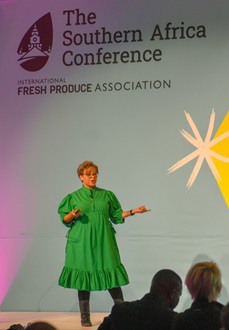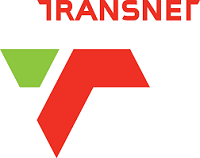 "There's a lot that we need to do to turn the ship around," state-owned port and rail authority Transnet Group CEO Michelle Phillips told the delegates at the International Fresh Produce Association's annual Southern Africa Conference. Many of these attended the event with the express purpose of hearing what she has to tell the industry.
"There's a lot that we need to do to turn the ship around," state-owned port and rail authority Transnet Group CEO Michelle Phillips told the delegates at the International Fresh Produce Association's annual Southern Africa Conference. Many of these attended the event with the express purpose of hearing what she has to tell the industry.
Fruit industry stakeholders working closely with Ms Phillips and the managing executive of Western Cape terminals Oscar Borchards report a changed institutional culture at Transnet, an urgency in addressing equipment shortages and time lost during shift change-overs.
Exporters still express frustration at the time their product spends in-transit - a 45-day journey through Cape Town to Europe has become their norm, according to one avocado exporter at the conference, almost double the norm of years before.
However, a theme that ran through various presentations at the IFPA conference was that seeing only a gloomy picture is fallacious.
Ms Phillips' presentation was preceded by that of political analyst Frans Cronjé, explaining why South Africa's new post-election government of national unity - a coalition between the aspirant middle-class and the established middle-class - should be cause for celebration with a very high potential for success. If it is not derailed by economic contraction and radicalisation. He repeatedly made the point that the South African media was overlooking the achievement of this best-possible outcome of a democratic election with a knee-jerk negativity that played into the hands of the "spoilers".
Ms Phillips repeated this sentiment: despite the good work that is happening, South Africans need to understand the impact of negative stories that are too easily foregrounded at the expense of real gains made.
View the 2024 IFPA conference photo report
Transnet looking for private sector participation
"It's a very difficult task to turn Transnet around. First and foremost, we need to stop the bleeding, fix the basics and get the operations working again. Then we have to find a new way to do business. We want the private sector involved in our business, there's no doubt about that," she said. They're working closely with organised labour to explain their reasoning on this point, explaining that private sector participation (PSP) is not privatisation and that government is not seeking to hand over public ownership of assets. "We've seen examples in other African ports where PSPs have worked, we know that it works."
Transnet Group CEO Michelle Phillips.
Rail-linked reefer connectivity
Specifically on the fruit side: the kind of opportunities that exist and that Transnet may come to the market with are branch lines that are economically viable if farmers consolidate in an area and Transnet brings a train to the siding. These lines could be concessioned off to the market. The Belcon facility will be fully launched in June next year to take away some of the congestion in the port stage.
Cold-chain rail requirements are an aspect where they'd like the private sector to play a role, additional reefer train sets with on-board power supply. Transnet wants rail to be 10% to 20% cheaper than using road transport.
"We want to lessen some of your pain. We cannot have the same experience we had during previous years when it comes to getting your products out of the country. We work very closely with the associations, the customers, the shipping lines."
Transnet was fully aware, she remarked, that South African fruit exports lose market share to other parts of the world if it could not consistently honour supply commitments.
The Western Cape fruit game plan includes two trains a day for maximised rail use, among other details that Mr Borchards will share with the industry.
View the 2024 IFPA conference photo report
Equipment purchase drive
It's unfortunate that the rains caused some wash-aways in the Western Cape, she observed, but looking ahead at the 2024/2025 grape season "we do not want to experience what we experienced during the past season", she stated. "We have gone on quite a drive to get equipment that are more wind-resistant to better match the conditions in the Western Cape."
They've embarked on a big equipment purchase programme to renew the fleet, and they have entered into long-term technical maintenance agreements with suppliers, an aspect that is deeply appreciated by the industry.
Five new cranes for Durban Container terminal and Port Elizabeth have been ordered and 44 rubber-tyred gantry (RTG) cranes have been ordered for Cape Town and Durban pier 1, she announced to applause from delegates. Nqgura and Cape Town will receive almost 100 new haulers in total between them. Straddle carriers are very difficult to manage, she noted, and twenty new units have been ordered.
"We are moving in the right direction. A number of very good men and women are very hard to do their duty towards the country. We will continue to do our best to meet and exceed your expectations."
 For more information:
For more information:
Transnet
www.transnet.net
